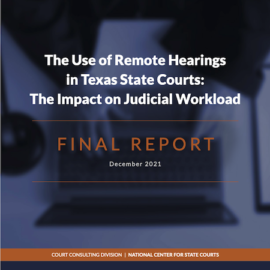The first national review of data that confirms what judges have anecdotally shared about remote hearings before and during the pandemic. The 12-month study analyzed both 1.25 million minutes of judicial data and focus group feedback from judges and court leaders in eight counties across Texas. The National Center for State Courts (NSCS) study, supported with funding from the State Justice Institute, found that remote proceedings take about a third longer than in-person hearings largely due to technology-related issues and lack of preparation by participants. But the study also found that remote proceedings take longer because they increase access to justice, as litigants can more easily attend and participate in hearings. To read NCSC’s full report
New Resources for Dependency Fact Finding and TPR Trials
As courtrooms are starting to open up more, and many courts are using a hybrid model allowing some participation remotely, the attached sample documents may be a good resource in preparing for Fact Finding and Termination of Parental Rights trials. The Child Welfare Committee of the Board of Judicial Administration Court Recovery Task Force created three sample documents (see attached), which have been endorsed by the Task Force: SAMPLE Pre-Trial Order for Remote Dependency Fact Finding or TPR Trials….
New DOH Guidance on Safe Behaviors Post-Vaccine – Implications for Family Time Visits
The Washington State Department of Health (DOH) is adopting the guidance released by the Centers for Disease Control and Prevention (CDC) regarding post-vaccine behavior. This has implications for families to visit without masks, when a parent has been vaccinated. The guidance provides that, if someone has been fully vaccinated, they can: Gather indoors with fully vaccinated people in private residences without wearing a mask and, Gather indoors with unvaccinated people from one other household in private residences (for example, visiting
COVID-19 Impact on the Mental Health of Children and Youth in Care
Childhood health experts are deeply concerned that the COVID-19 pandemic has serious consequences for children and youth, delaying their cognitive, emotional and social development. Children in foster and relative care, who have experienced abuse or neglect and the trauma of removal, are likely to experience disproportionately more significant behavioral health impacts from the pandemic. Resources are available to understand the behavioral health impact and support the well-being of children and youth in care.
New DCYF Family Time Guidance for Making Temporary, COVID-Related Changes to Court-Ordered Visits
DCYF and court partners worked with DOH to develop new in-person Family Time guidance that directs parties in every case to work together to reduce the opportunity for viral transmission during visits by creating Temporary COVID Aware Family Time Plans. The guidance does not eliminate in-person Family Time, due to the vital importance of keeping families connected during the pandemic. If parties cannot agree on a temporary plan, the issue will be brought to court.
Children’s Bureau Letter re: Continuation of Critical Court Hearings, Family Time and Services – December 4, 2020
In a December 4, 2020, Letter to the Field – Ensuring the Continuation of Critical Court Hearings, the federal Children’s Bureau urges courts and child welfare agencies to continue working together to ensure that access to justice continues and that critical judicial oversight occur in child welfare proceedings during these difficult times.
Understanding COVID-19 Risks for Various Activities
A useful chart, created by the Texas Medical Association, to help identify the risks of potentially contracting COVID-19 when participating in a range of activities. This tool can help families and caregivers make informed choices – and support good decision-making for in-person Family Time plans.
Incarcerated Parents’ Access to Virtual Dependency Hearings
The Department of Corrections is now providing mandatory virtual participation in child-dependency court hearings for incarcerated parents to ensure access when in-person participation is unsafe due to the pandemic. Current policy and procedures are provided in a DOC memo.
Making Reasonable Efforts Findings in a Pandemic – NCJFCJ Webinar
WEBINAR The National Council of Juvenile and Family Court Judges (NCJFCJ) hosted a webinar on Making Reasonable Efforts Findings in a Pandemic. Taught by NCJFCJ Past President Judge R. Michael Key, the webinar and related materials help juvenile and family court participants understand the importance of examining reasonable efforts during the current COVID-19 pandemic.
Supreme Court Extended and Revised Order Re: Dependency and Termination Cases
On October 14, 2020, the Supreme Court of Washington issued a Revised Emergency Order on Dependency and Termination Cases, modifying certain provisions of its April 30th order to better guide court operations going forward in the COVID-19 pandemic.





